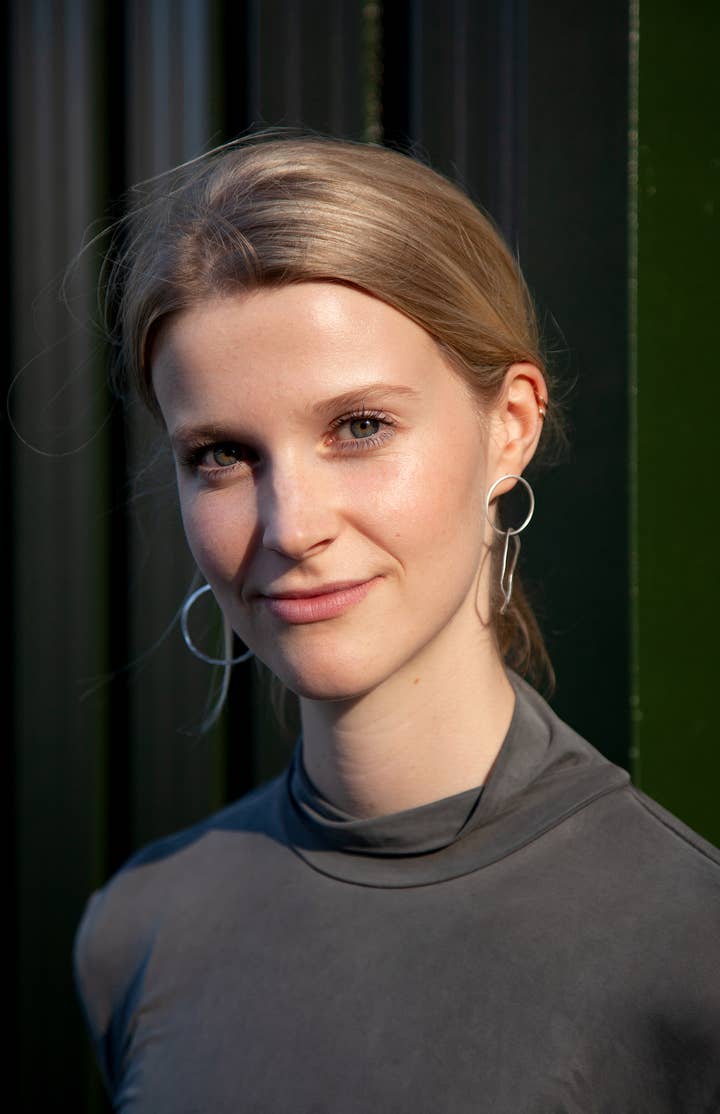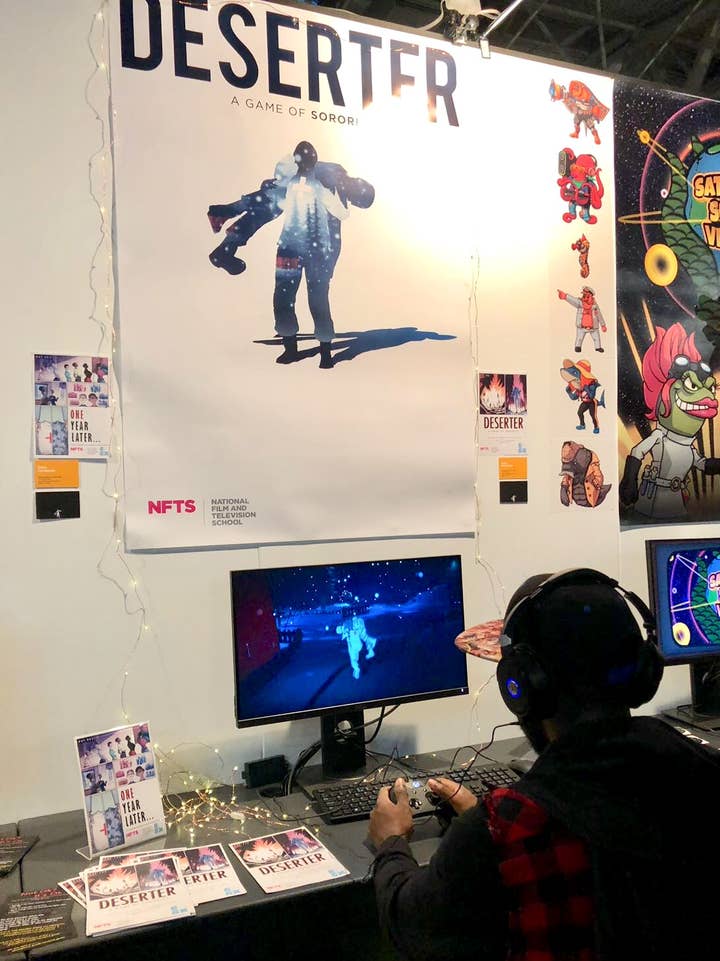"It's not enough to point at Bayonetta or FemShep and say 'job done'"
NFTS student Daisy Fernandez discusses female representation in games and the barriers for women seeking a career in development
The games industry's gender imbalance has been well documented, as have the potential hurdles women face when trying to establish themselves as a developer. So it is always encouraging to meet a new generation of talent undeterred on their journey to bring fresh ideas to the business.
One such up-and-comer is Daisy Fernandez, an MA student at the renowned NFTS, who recently showed off her upcoming title Deserter: A Game of Sorority at EGX 2018. As Fernandez enters the second and final year of her studies, she reflects on the many barriers she has already overcome.
"The main obstacle for me was at school," she tells GamesIndustry.biz. "I first started expressing an interest in making games when I was at senior school, and I mentioned games alongside film and TV; I just wanted to tell stories and those are the three mediums I think are interesting.

"[Careers advisors] completely ignored my game-making aspirations and just pushed me more in the TV/film direction. As a self-conscious teenager, if the game-making excitement had been nurtured a bit earlier I think I would have started making games sooner. You need some kind of aspirational figure, or someone who's excited about the prospect of it - or at least, that's what I needed and I didn't have it. It was only recently when I became a bit jaded about working in TV and film that I realised games was what I really in my gut wanted to do."
Fernandez also observes that the mainstream perception of the games industry is still somewhat negative, particularly among parents, adding: "It's not a career aspiration that many are going to get behind."
This is in part due to the fact that "only the games with notoriety" tend to be covered by the media - the Grand Theft Autos and Fortnites of the world - drowning out word of more experimental developers like Brie Code and Nina Freeman. Hostile attitudes towards women in games via social media are also an issue.
"A lot of the challenges come from the online space. When things like Gamergate bleed into the mainstream consciousness, it's not going to do much to reinform the public or aspiring developers about what the industry is like," she says. "And that's a shame because I really have met so many creative and progressive individuals and organisations from my short time in the games industry."
"[Careers advisors] completely ignored my game-making aspirations. If this had been nurtured a bit earlier I think I would have started making games sooner"
With aspirations of becoming a narrative designer or game director, Fernandez hopes to contribute to changing perceptions of video games and the career opportunities they offer women in her own way - starting with Deserter.
Developed over the course of the past year, this dark narrative game centres on a fugitive nurse carrying an unconscious soldier through wartorn and occupied farmland. The game takes about 10 minutes to play through and has been inspired by design elements from classic adventure Ico and indie hit Inside.
Deserter also takes inspiration from Stanley Kubrick film Paths of Glory - "an incredibly moving a very human portrayal of desertion" - as well as German TV show Generation War, which follows four teenagers and their individual experiences of World War II. Fernadez believes there is "really rich territory" for war games that place players in a non-heroic role - as evidenced by Valiant Hearts and This War of Mine. However, the wartime setting also stemmed from the need for context around a core mechanic.
The unconscious character is central to a concept Fernandez was interested in: creating an emotional attachment between the player and the 'tool' used to solve puzzles (in this case, a human body). Combined with the decision to make the player-character a nurse, this led to people interacting with the game in ways the student developer did not expect.
"There's one part where your trying to make a route through a fence, and I put a no entry sign up for environmental effect, but players who are testing go, 'ooh, I can't go through there'. They have taken on the role of a nurse, someone who traditionally obeys rules," she explains. "My producer pointed out it's kind of like the opposite of the Stanford Prison Experiment - people put on the uniform of a nurse and they act in a more upstanding way."

Having showed the game off at EGX under the NFTS banner, Fernandez now hopes to use feedback from the show to tweak and improve before releasing on an open platform such as Itch.io.
While Fernandez leads development, she's not making the game alone and has "made a conscious effort" to get as many women into key roles as possible. She has a female co-producer, screenwriter and production designer, with women making up roughly half the team behind Deserter.
There's a female digital marketer behind the game's promotions via social media, with tweets for Deserter - and indeed from Fernandez' own account - often bearing hashtags such as #womeningames, #girlsbehindthegames and #womenbehindthegames.
This brings the conversation back to encouraging more women to enter games development, with Fernandez acknowledging the use of such hashtags are just part of the effort to emphasise the role of women in Deserter's creation. The choice of having two female characters at the core of the game was also no accident.
"I think it's a matter of representation," says Fernandez. "Whilst there are a number of female protagonists in video games, it's not enough to point at Bayonetta or FemShep and say 'job done'.
"I have a lot of faith in the games industry becoming a space where women are respected as characters, consumers and developers"
"One thing that I really want to stress is that I don't think the solution is to police or censor violent or sexual depictions of women in games. To me, it's about creating a bigger variety of female representations instead of just repeatedly falling back on character tropes. It's in everyone's best interest. We'll have far more interesting games as a result.
"It was important to me that the protagonist of Deserter was a female antihero. She's deeply compassionate, but she's also stubborn and steely. I like characters who are capable of just as many bad actions as good actions because that's what people are like it real life regardless of gender, and that's what makes for good stories."
Of course, pushing complex female characters as a way to broaden the industry - and even highlighting the role of women in creating them - is all too often met with toxicity online. Even AAA blockbusters aren't exempt from this, as the #NotMyBattlefield grumbling proved when EA dared to put a woman on the cover of the upcoming shooter.
In the face of such uninformed but inevitable vitriol, is this not a deterrent for aspiring developers like Fernandez, a reason to perhaps make safer choices in their creations as they try to establish themselves in the industry?
"It's intimidating," she admits, "but it's more important to me to make stories I'm interested in with characters I'm interested in, rather than fear this imaginary audience who will probably troll me online at some point in my career anyway.
"I just think there needs to be more female developers pushing a more diverse representation of women in games. I have a lot of faith in the games industry becoming a space where women are respected as characters, consumers and developers."
